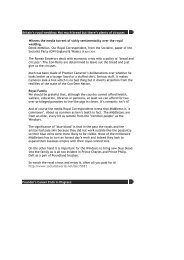New meanings of Panafricanism in the era of globalisation
New meanings of Panafricanism in the era of globalisation
New meanings of Panafricanism in the era of globalisation
You also want an ePaper? Increase the reach of your titles
YUMPU automatically turns print PDFs into web optimized ePapers that Google loves.
destabilisation and that many <strong>of</strong> <strong>the</strong> firms that are now <strong>of</strong>fer<strong>in</strong>g to rebuild <strong>the</strong> country are<br />
<strong>the</strong> same ones that collaborated <strong>in</strong> <strong>the</strong> destruction <strong>of</strong> its <strong>in</strong>frastructure and <strong>the</strong> decimation<br />
<strong>of</strong> its human resources. As Daniel and his colleagues po<strong>in</strong>t out, this is a particularly wry<br />
case <strong>of</strong> reap<strong>in</strong>g where one has sowed. And, I would add, that <strong>in</strong> <strong>the</strong> case <strong>of</strong> Angola, one<br />
<strong>of</strong> <strong>the</strong> th<strong>in</strong>gs that were sown was someth<strong>in</strong>g called “dragon’s teeth” <strong>in</strong> <strong>the</strong> form <strong>of</strong><br />
landm<strong>in</strong>es. It is a pa<strong>the</strong>tic and pitiable fact that South Africa has accumulated <strong>the</strong> best<br />
landm<strong>in</strong>e-remov<strong>in</strong>g expertise <strong>in</strong> <strong>the</strong> world as <strong>the</strong> result <strong>of</strong> <strong>the</strong> “efforts” <strong>of</strong> its rul<strong>in</strong>g class<br />
<strong>in</strong> Angola.<br />
Given <strong>the</strong> sensitivity <strong>of</strong> cont<strong>in</strong>ental politics and <strong>the</strong> need for South Africa’s political<br />
leadership to avoid any whiff <strong>of</strong> Big Bro<strong>the</strong>rism or <strong>of</strong> want<strong>in</strong>g to throw its weight around<br />
as a k<strong>in</strong>d <strong>of</strong> regional bully-boy, it is significant that <strong>the</strong> penetration <strong>of</strong> <strong>the</strong> cont<strong>in</strong>ent by<br />
South African capital has mostly taken <strong>the</strong> form <strong>of</strong> mergers, take-overs and jo<strong>in</strong>t<br />
ventures, even though some “greenfield <strong>in</strong>vestment” has taken place, as <strong>in</strong> <strong>the</strong> spectacular<br />
example <strong>of</strong> <strong>the</strong> Shoprite supermarket cha<strong>in</strong> which, at <strong>the</strong> time <strong>of</strong> writ<strong>in</strong>g, had 89 stores <strong>in</strong><br />
14 o<strong>the</strong>r African countries and expected to grow much more rapidly over <strong>the</strong> next few<br />
years (see Daniel et al 2003:379). This fact gives a different perspective on what is meant<br />
by <strong>the</strong> “<strong>New</strong> Partnership for Africa’s Development” (NEPAD), which is usually<br />
<strong>in</strong>terpreted as an attempt to get <strong>the</strong> transnational corporations based <strong>in</strong> <strong>the</strong> North to enter<br />
<strong>in</strong>to a “Marshall Plan”-type partnership with <strong>the</strong> bus<strong>in</strong>ess firms and governments <strong>of</strong><br />
Africa for its economic development. For, as I shall show presently, although it is<br />
essential to dist<strong>in</strong>guish between <strong>the</strong> South African government’s motives and modalities<br />
<strong>in</strong> conduct<strong>in</strong>g foreign policy on <strong>the</strong> cont<strong>in</strong>ent and <strong>the</strong> pr<strong>of</strong>it-driven strategies <strong>of</strong> big<br />
bus<strong>in</strong>ess 13 , <strong>the</strong>re is, clearly, a strong causal l<strong>in</strong>k between <strong>the</strong> two processes. Indeed, it is<br />
important to state that <strong>the</strong> thrust <strong>in</strong>to Africa is a well co-ord<strong>in</strong>ated strategy <strong>in</strong>volv<strong>in</strong>g all<br />
six <strong>of</strong> <strong>the</strong> ma<strong>in</strong> economic sectors <strong>of</strong> South Africa and both private and public sector<br />
enterprises. The crown<strong>in</strong>g goal <strong>of</strong> this thrust is <strong>the</strong> truly panafrican project <strong>of</strong> “awesome<br />
dimensions”, as Daniel et al (2003:381) call <strong>the</strong> vision <strong>of</strong> an energy grid across <strong>the</strong> entire<br />
13 In a recent article <strong>in</strong> <strong>the</strong> South African newspaper, Bus<strong>in</strong>ess Day, Diana Games (2003) writes about <strong>the</strong><br />
perception <strong>of</strong> South African firms <strong>in</strong> many o<strong>the</strong>r African countries. “SA has been accused <strong>of</strong> bully<strong>in</strong>g local<br />
bus<strong>in</strong>ess and crush<strong>in</strong>g competitors while cont<strong>in</strong>u<strong>in</strong>g to protect its own economy. The debate on whe<strong>the</strong>r SA<br />
is an economic powerhouse or simply a bully has ga<strong>in</strong>ed momentum recently”.<br />
13
















